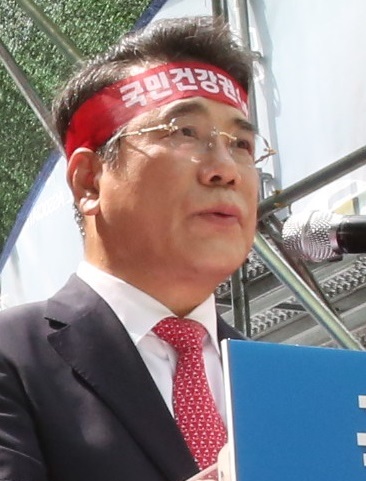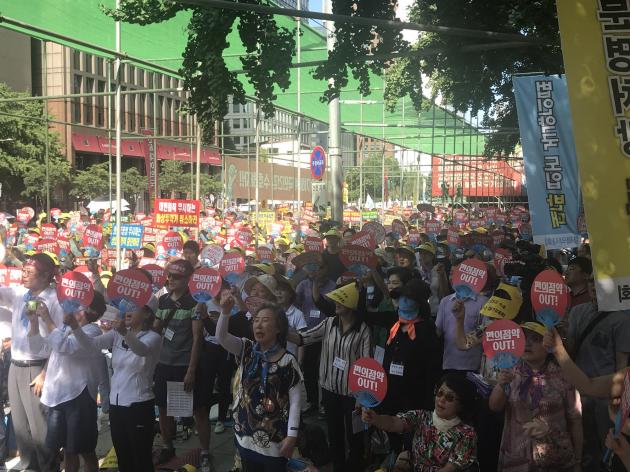Druggists protest expansion of OTC drug sales at convenience stores, demand public night-time pharmacies
Despite the hot weather with daytime highs exceeding 37 degrees Celsius across the nation, thousands of pharmacists took to the street to thwart the sales of over-the-counter (OTC) drugs at convenience stores and demand public night-time pharmacies.
The Korean Pharmaceutical Association (KPA) held the rally in Cheonggye Plaza in central Seoul, Sunday, to criticize the government’s scheme to make more OTC drugs available at convenience stores.
The pharmacists carried pickets with phrases such as “If OTC drugs become easily accessible at convenience stores, there will be more drug dispensing errors,” “An attempt to kill the function of pharmacists enrages 80,000 pharmacists,” “Cancel the plan to install remote dispensing machines which ignores the principle of face-to-face drug dispensing,” and “Seeking convenience only will hurt the public health.”

“Although we held a rally last year (in December) to protest the government’s attempt to expand OTC drug sales at convenience stores which will hurt the people’s rights to health, the government seems to be negligent to people’s health and safety,” KPA president Cho Chan-hwi said. “KPA will firmly resist any attempt to infringe upon or undermine our jobs.”
Most urgently, the KPA called for the government to nullify the plan to expand the list of OTC drug types available at convenience stores and to stop automated drug dispensing machines from arriving in the market. A bill to allow remote dispensing is pending at the National Assembly.
Also, the group also demanded the government resolve the problem of some large-scale pharmacies run under a borrowed pharmacist license and introduce prescriptions by drug ingredients.
Keywords in the rally: OTC drug sales at convenience stores, remote dispensing
The Ministry of Health and Welfare operates a committee to review and designate safe, household medicines. The panel recently discussed expanding the list of such medications.
At the fifth session late last year, the committee proposed to add Gelfos, a gastric antiacid treatment, Smecta, an ant diarrheic treatment, to the list of non-prescription drugs at convenience stores.
However, Kang Bong-yoon, the policy head of the KPA and one of the voters for the committee, vehemently opposed to the idea and the discussion did not progress further.
The government’s plan to introduce automated drug dispensing machines also faces a severe backlash from pharmacists.
The related bill aims to put automated dispensing machines in front of pharmacies and allow consumers to purchase OTC medicines at night or on holidays under the guidance of pharmacists.
The discussion took shape in 2016 for the first time under the New Industry Investment Committee under the Prime Minister’s Office. Although a lawmaker proposed a revision bill to the Pharmaceutical Affairs Act, the bill is still pending.
The KPA argues that remote dispensing runs counter to the principle of face-to-face drug sales. As vending machines will sit outdoor for a long-term, medicines could go bad, and people might abuse the use of such drugs, pharmacists say.

However, observers say more types of OTC drugs at convenience stores and the introduction of automated dispensing machines will not immediately threaten pharmacists’’ jobs and profits.
Most pharmacists, however, worry that such policy will lead to more online sales of non-prescription drugs and continued expansion of the OTC drug list at convenience stores.
Particularly after the separation of drug prescribing and dispensing, the competition among pharmacists has become more intense. A growth of OTC drug sales on the internet and convenience stores could aggravate pharmacies’ drug sales and put more burden on pharmacy owners.
“Since I entered the college of pharmacy, I’ve always heard that the pharmacists were facing a crisis. It’s hard to tell now how much things will change when I become a pharmacist,” said a pharmacy student who participated in the rally.
Pharmacists under criticism for ‘collective selfishness’
Pharmacists’ rally, however, only met public criticism that they fought against the government without suggesting any solution.
Many internet users called the KPA’s move “collective selfishness,” saying the pharmacists were making it more difficult to purchase OTC drugs. Some even said, “Do we need a pharmacist’s job,” and “Why shouldn’t convenience stores sell drugs when pharmacies sell non-drug products.”
A pharmacist who joined the rally said, “It is important for us to prepare an alternative policy. If we fail to earn empathy for the KPA’s claims, it will only increase people’s antipathy toward us.”
Another pharmacist said the KPA was internally divided.
“Some pharmacists were not happy with the KPA’s budget spending for the rally. Some others think the rally will affect the results of the KPA election late this year. We need internal solidarity now,” he said.
Organizers of the KPA rally estimated that about 3,300 pharmacists joined the protest, while the police said the number was about 2,500.

